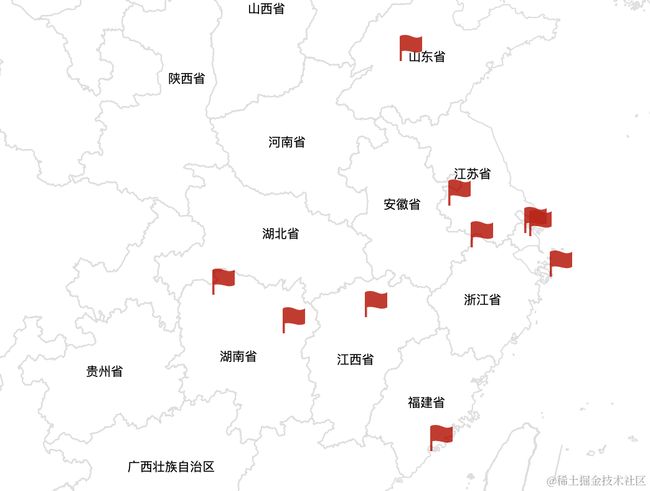在 vue3 中使用 openlayers 制作旅行地图
由于上半年经常跑出去玩,突然想做一个旅行地图的博客,想起之前接触过 openlayers 的项目,也懒得去调查别的库了,直接用 openlayers 开干。由于github经常构建失败,我部署到vercel上去了,现在能正常访问了,而且感觉速度也稍微比github快一些。
-
链接
- 项目代码github链接
- 博客原文链接
- 旅行地图预览链接
-
效果预览
安装
vue 的项目搭建就不说了,直接安装 ol 就可以开写了
npm i ol
创建地图
const { center, zoom, minZoom, maxZoom, extent } = MAP_DEFAULT_OPTIONS;
const map = new Map({
target: "map",
layers: [],
controls: [],
});
map.setView(
new View({
center: fromLonLat(center),
zoom,
minZoom,
maxZoom,
constrainResolution: true,
extent: transformExtent(extent, EPSG4326, map.getView().getProjection()),
})
);
添加图层
创建图层,我这里用的是 geojson 的数据创建的,可以在网上找到你想要创建地图的 geojson 数据。
const layer = new Vector({
source: new SourceVector({
url,
format: new GeoJSON(),
}),
});
layer.setStyle(CreateLayerStyle);
创建多个图层添加到组内,比如亚洲图层,中国图层
const layerGroup = new Group({
layers: [asiaLayer, chinaLayer],
});
map.addLayer(layerGroup);
实现放大现在省份图层
由于中国图层的 geojson 就只包含省份的边界线,我想要在放大的时候加载出城市的边界线,就得添加省份的 geojson 数据。
监听地图的 change 事件,判断缩放发生大于某个数的时候,添加对应的省份图层
- LayerCacheMap 省份图层
- currentExtent 当前视图范围
- isCityInView 判断省份是否在当前视图中
- layer.setVisible 设置图层显示隐藏
map.getView().on("change", function (event) {
const mapView = event.target;
// 获取新的缩放级别
const zoom = event.target.getZoom();
// 当前视图范围
const currentExtent = mapView.calculateExtent(map.getSize());
const transformedExtent = transformExtent(
currentExtent,
mapView.getProjection(),
EPSG4326
);
if (zoom > index) {
// 显示2级涂层
for (const key in ALL_EXTENT) {
const extent = ALL_EXTENT[key];
// 判断省份是否在当前视图中
const isCityInView = intersects(extent, transformedExtent);
const layer = LayerCacheMap[key];
if (!layer) continue;
if (isCityInView) {
layer.setVisible(true);
} else {
layer.setVisible(false);
}
}
} else {
// 移除2级涂层
for (const key in ALL_EXTENT) {
const layer = LayerCacheMap[key];
if (layer) layer.setVisible(false);
}
}
});
- 效果
实现主题切换
监听 isDark 的变化,遍历所有图层,使用 layer.setStyle 改变图层的 style
const isDark = useDark();
watch(isDark, () => {
for (const key in LayerCacheMap) {
if (Object.prototype.hasOwnProperty.call(LayerCacheMap, key)) {
const map = LayerCacheMap[(key as any) as LayerIndex];
for (const key in map) {
if (Object.prototype.hasOwnProperty.call(map, key)) {
const layerMap = map[key];
if (layerMap.layer) {
// 设置主题
layerMap.layer.setStyle(CreateLayerStyle);
}
}
}
}
}
});
- 效果
添加标点
- 创建一个 marker layer 图层来收集所有的点
- 通过数据批量创建点要素,设置样式
const container = new Vector({
source: new SourceVector(),
});
// 获取标点的数据
const markerList = CreateMapMarkerData();
markerList.forEach((item) => {
// 创建点要素,添加到container layer中
const pointFeature = CreatePointFeature(item);
if (pointFeature) container.getSource()?.addFeature(pointFeature);
});
- 根据位置信息创建点要素
const pointFeature = new Feature({
geometry: new Point(fromLonLat(item.coords)), // 设置点的坐标
info: item,
});
// 创建一个图标样式
const iconStyle = new Style({
image: new Icon({
src: "/images/icons/marker.svg",
color: "red",
scale: 1,
anchor: [0.15, 0.9], // 图标的锚点位置
}),
});
pointFeature.setStyle(iconStyle);
- 效果
为标点添加事件
- 移动到标点出显示标点信息
- 使用创建交互事件
- layer 交互图层为 marker container
- condition 交互条件为鼠标悬停 pointerMove
import { pointerMove } from "ol/events/condition";
const interaction = new Select({
layers: [layer], // 指定可以触发交互的图层
condition: pointerMove, // 鼠标触发条件
style: null, // 禁用默认样式
});
- 绑定交互事件触发的回调函数
- 获取标点 event.selected[0]
- 获取标点信息 selectedFeature.get(“info”)
- 在鼠标移入标点时触发相应的事件,比如修改指针
- 鼠标移出时触发相应的事件
let markerInfo: MarkInfo = {
info: {},
coords: [],
};
interaction.on("select", (event) => {
// 悬停事件触发
if (event.selected.length > 0) {
const selectedFeature = event.selected[0];
// 保存标点信息
markerInfo.info = selectedFeature.get("info");
const geometry = selectedFeature.getGeometry();
if (geometry instanceof Point) {
// 保存标点位置
markerInfo.coords = geometry.getCoordinates();
}
// 设置 preview 的显示内存
const element = document.getElementById("map_marker_preview");
element.textContent = markerInfo.info.title;
// ...
// 设置鼠标指针为 pointer
map.getTargetElement().style.cursor = "pointer";
} else {
// 鼠标移出触发
// ...
map.getTargetElement().style.cursor = "default";
}
});
- 添加点击事件
触发点击事件跳转到对应的链接
import { click } from "ol/events/condition";
const interaction = new Select({
layers: [layer],
condition: click,
style: null,
});
interaction.on("select", (event) => {
if (event.selected.length > 0) {
const selectedFeature = event.selected[0];
const info = selectedFeature.get("info");
if (info?.route) router.push(info?.route);
}
});
- 效果
航行路线
其实标点做完已经完成了我的目标和想要的效果了,不过最近比较清闲,就想加点花哨的东西,添加一个飞机飞过的航行络线。
- 创建飞机、路线图层
const source = new SourceVector();
const layer = new Vector({ source });
map.addLayer(layer);
- 创建一架飞机
- extent 目的地的坐标
- degrees 飞机初始的旋转角度
- countDegrees 通过起始坐标和终点坐标来计算 degrees
const extent = transform(event?.coords, EPSG3857, EPSG4326);
const degrees = countDegrees(START_POINT, extent);
const feature = new Feature({ geometry: new Point([]) });
const style = new Style({
image: new Icon({
src: "/images/icons/plane.svg",
scale: 1,
rotation: toRadians(45 + 360 - degrees),
}),
});
feature.setStyle(style);
source.addFeature(feature);
- 飞行路线
- 根据标点创建不同的路线
- 使用 LineString 创建线段要素
- interpolatePoints 根据起始点和终点插值(我的效果是使用贝塞尔曲线创建的)
const features: Record<string, Feature> = {};
const markers = CreateMapMarkerData();
markers
.filter((m) => !!m.coords)
.forEach((marker) => {
// 插值
const coords = interpolatePoints(START_POINT, marker.coords, 100);
const feature = new Feature({
geometry: new LineString(coords),
});
// 设置样式
feature.setStyle(CreateLineStyle());
features[marker.route] = feature;
});
- 飞行动画
根据线路的坐标在设置的时间内 Duration 不停的改变飞机的坐标位置
const line = lineFeature?.getGeometry();
const coordsList = line.getCoordinates();
let startTime = new Date().getTime();
function animate() {
const currentTime = new Date().getTime();
const elapsedTime = currentTime - startTime;
const fraction = elapsedTime / Duration;
const index = Math.round(coordsList.length * fraction);
if (index < coordsList.length) {
const geometry = feature.getGeometry();
if (geometry instanceof Point) {
geometry?.setCoordinates(coordsList[index]);
}
// TODO 飞机转向
requestAnimationFrame(animate);
} else {
callback();
}
}
animate();
- 效果
左上角是信息预览和路线预览的开关。
可以看到飞机的初始方向是对的,但飞行起来就不对了,因为我还没有做哈哈哈哈,需要在动画里每一帧根据坐标去计算飞机的角度,之后再更新吧。
飞机转向(更新)
其实也很简单,就是记录一下上一次的位置信息,计算一下偏移角度调用 setRotation 在动画的每一帧设置一下就可以了
if (lastCoords) {
const degrees = toRadians(
45 + 360 - countDegrees(lastCoords, coordsList[index])
);
(feature.getStyle() as Style)?.getImage()?.setRotation(degrees);
}
lastCoords = coordsList[index];
- 效果
总结
如果感兴趣的话可以关注我的github。
对我的博客项目感兴趣可以关注my blog github,我会不定期地持续地更新,欢迎大佬添加友链。
这里是旅行地图预览地址,由于github actions经常会因为错误提交而构建失败,之前vercel构建出来页面刷新会404。
现在已经解决了vercel刷新404的问题,于是重新部署到vercel上m,my blog
所有的展示图片来自录屏再通过my tools转换为 gif。

